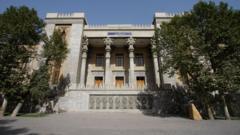Iran's Supreme Leader Ali Khamenei has cast significant doubt on the likelihood of reaching a nuclear agreement with the US, pointing to "outrageous" enrichment demands, as negotiations continue amidst rising tensions.
Iran's Supreme Leader Skeptical of US Nuclear Deal Prospects

Iran's Supreme Leader Skeptical of US Nuclear Deal Prospects
Iran's Khamenei expresses doubt regarding potential outcomes from nuclear discussions with the US, criticizing American demands.
Iran's Supreme Leader, Ayatollah Ali Khamenei, has publicly questioned the potential for a new nuclear agreement with the United States, expressing skepticism about the ongoing negotiations. He labeled US demands regarding uranium enrichment as "excessive and outrageous," leading him to conclude, "We don't think it will lead to any outcome."
His statement follows indications from US President Donald Trump, suggesting Iran had provisionally accepted the terms of a deal after four mediation rounds conducted by Oman since April. However, in anticipation of upcoming talks this weekend, Iran's chief negotiator dismissed Trump's claims, asserting that halting uranium enrichment—a vital aspect of nuclear fuel processing with potential weapons implications—was non-negotiable.
President Trump, who abandoned the original 2015 nuclear agreement during his term, has warned Iran of military action from the US and its ally Israel if discussions yield no results. Iran maintains that its nuclear pursuits are peaceful, resolutely denying any intentions to develop nuclear weaponry. Nonetheless, it has surpassed certain restrictions of the former accord in response to stringent US sanctions reinstated seven years ago, accumulating substantial stocks of highly-enriched uranium that could effectively be fashioned into nuclear bombs.
Amidst a ceremony commemorating late President Ebrahim Raisi, Khamenei referred to his predecessor’s staunch refusal to engage with the US, stating, "He clearly said 'no' without ambiguity." He emphasized that Raisi consistently resisted coercive tactics aimed at forcing Iran to the negotiation table. Khamenei voiced his lack of optimism towards the current negotiator, Masoud Pezeshkian, indicating little hope for breakthroughs as he reflected on past failures during the previous talks under the more moderate cleric Hassan Rouhani.
The Supreme Leader criticized the Trump administration, advising the American side to refrain from what he termed "nonsensical remarks," asserting that Iran's capacity to enrich uranium does not require external approval. US special envoy Steve Witkoff recently remarked that any prospective agreement must not allow Iran any enrichment capability, underlining a clear stance for a deal devoid of such provisions to avert any potential weaponization.
Iranian Foreign Minister Abbas Araqchi swiftly countered, challenging Witkoff's unrealistic expectations and reiterating that enrichment is an integral aspect of the country's nuclear policy. He accused the US delegation of being detached from the realities of the negotiations.
The original 2015 agreement—negotiated under President Barack Obama—mandated that Iran limit its nuclear activities and permitted inspections from the International Atomic Energy Agency (IAEA) in exchange for sanctions relief. As part of the deal, Iran could only enrich uranium to a purity of 3.67%, suitable for commercial nuclear reactors. However, the IAEA recently reported that Iran has amassed nearly 275kg of uranium enriched to 60% purity, alarmingly close to weapons-grade material, which poses significant international security concerns.




















